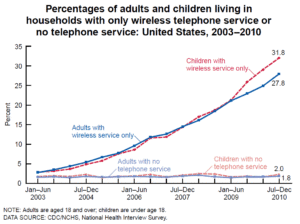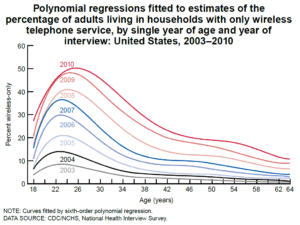Smartphones Matter More than Cell Phones
The most recent government estimates of cell phone usage among U.S. households were released a few weeks back, and the pace at which landline usage is disappearing is astonishing. Here are just some of the numbers:
- Thirty percent of U.S. households do not have a landline telephone
- An additional 16% have a landline telephone, but never or rarely use it to receive calls
- The percentage of households without landlines is increasing by about five to six percentage points each year
- Half of young adults under age 30 have no landline in their homes
- Half of adult renters have no landline in their homes
- Nearly four out of ten Hispanic adults have no landline in their homes
For anyone doing random sample surveys of consumers, the implications are huge. Methodological purists insist that only phone-based surveys are rigorous, but clearly the biases of phone-based research can be severe, and no doubt they often are.
Putting aside the issue of research methods, however, we believe a more significant issue over the next few years will be the explosive growth in smartphone usage. Although not captured in government surveys that track phone usage and availability, the Pew center estimates that one-third of all U.S. adults currently own a smartphone, and industry analysts predict that by the end of 2011 half of all cell phones in the U.S. will be smartphones.
Why is this is so critical for researchers? Because more than any other technology since the widespread adoption of the Internet, smartphones are changing how consumers behave. Consumers get up in the morning and check media apps before brushing their teeth. Then while commuting to work or waiting for their computer to boot up, they purchase coupons for goods and services they might never have bought otherwise. They map and track their locations, and expect product features and services that can anticipate what they need.
Smartphones are important for reasons far beyond narrow methodological concerns about how to execute surveys. They are important because they are changing the very nature of what we research: how people behave and think, and what they buy, believe, want, and aspire to. Indeed, just as we nearly always ask our research respondents to tell us their gender, age, and income, we now often ask whether they have smartphones.
Beyond anything else, market research is about understanding people (the verstehen in Versta), which means our focus at Versta is always on the “what, how, and why” of what matters in peoples’ lives in a rapidly changing world. Smartphones matter in a more profound way than cell phones ever did.
—Joe Hopper, Ph.D.









